"See you soon" – then a life sentence. When someone you love is detained in a Russian prison camp in Siberia

The first Ukrainian person exiled to Siberia was Demian Ihnatovych (Mnohohrishnyi), a 17th century hetman, or military commander.
Under Soviet rule, dozens of Gulag forced labour camps for political prisoners, and "special settlements" – where thousands of Ukrainians, Crimean Tatars, Estonians, Latvians, Armenians, Germans, Fins, and other oppressed peoples were deported to – were built in Siberia.
A century later, Russia continues to deport Ukrainians to Siberia, holding them in prisons in squalid and dehumanising conditions. One such prison, Polyarny Volk (Polar Wolf), was established in the same premises once occupied by Gulag Camp No. 501.
Serhii Mykhailenko, a 26-year-old Azov Brigade fighter who took part in the defence of the Azovstal Iron and Steel Works in Mariupol, is now held in Russian captivity in Siberia. His wife Tamara was told that he is being held in the Polar Wolf prison camp.
Tamara found out her husband was imprisoned via Russian Telegram channels, after a show trial in Russian-controlled Donetsk. Mykhailenko’s sentence: life imprisonment.
Tamara didn’t receive letters from her husband; but was only able to see glimpses of him in Russian propaganda videos. To save her husband and other unlawfully convicted prisoners, she travelled all the way to the Vatican, to meet with the Pope.
Tamara told Ukrainska Pravda about her love for Serhii, her efforts to bring him back, surviving the Russian assault on Mariupol, and unlawful Russian trials for Ukrainian prisoners of war. She also spoke about her recent meeting with the Pope, and the hope she still harbours for Serhii’s release.
"Russia is frozen in the time when people can be deported to Siberia"
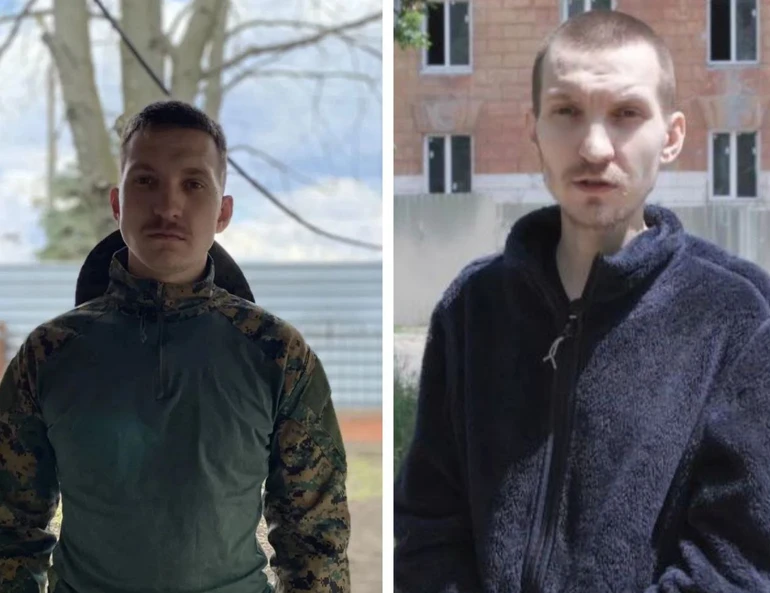
Tamara first saw her husband Serhii after his withdrawal from the Azovstal plant on 6 June 2023, although it was a strange "encounter".
The Russians shared a video in which Serhii was forced to confess crimes he never committed. He was emaciated, pale, and looked exhausted. It was difficult to believe he was the same person as the strong and tough Azov Brigade serviceman she had last seen.
"At first I didn’t pay attention to that video; the Russians often share such videos, it’s a known tactic of theirs. Then I started getting messages from friends telling me it was all over Russian media."
When I finally watched the video, I couldn’t believe it was my Serhii. He didn’t look like himself. He stuttered – I suspect that was the effect of torture. I cried all day long, I felt as though part of my soul had died," Tamara recalls.
After that, Tamara joined a psychological rehabilitation programme. She had no idea how much strength the coming weeks and months would require: as of that day, Serhii was officially the subject of a sham Russian investigation.
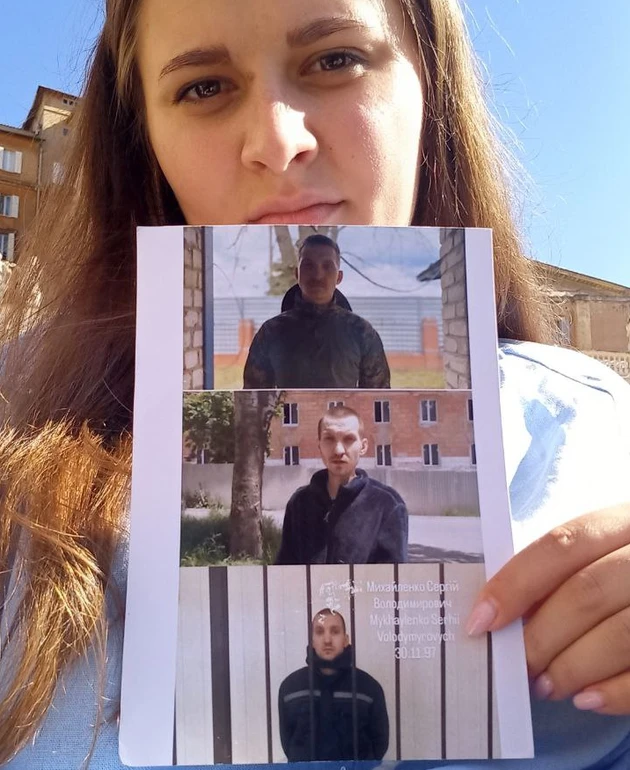
"This picture brings me so much pain. This is my husband before the war, in captivity, and during the sham trial. I hope that soon I will have a picture of him from our long-awaited wedding," Tamara says
On 16 January 2024, the Russians shared a photo from the show trial in Donetsk, which found Serhii guilty on trumped-up charges. His sentence: life imprisonment in a special regime prison camp.
According to Tamara, since then, Serhii has been held in the Correctional Facility No. 3, also known as the Polar Wolf prison camp, located within the Arctic Circle, in western Siberia (IC-3 of the Federal Penitentiary Service of Russia for the Yamalo-Nenets Autonomous Okrug).
"I saw his empty eyes, his pale face. He was extremely thin and had very light clothes on, despite the freezing temperatures outside. I know he’s in Siberia now, in the same prison where [Russian opposition leader] Alexei Navalny was held. It’s possible that he’s been in solitary confinement since April 2024. That’s horrifying.
I couldn’t believe that in the 21st century, an era of space travel and new technologies, Russia is frozen in the time when people can be deported to Siberia. I only read about this in books. I couldn’t imagine that I could end up in this situation," Tamara says.
She doesn’t get letters or phone calls from her husband. All she can do is follow Russian news and social media to find out whether her husband is alive.
"On 16 January, I saw a video from the courtroom and heard that he had been sentenced to life imprisonment. But what for? For defending Mariupol? I think I was going through my third rehabilitation programme at the time," says Tamara. "The situation with these unlawful trials appeared critical."
Tamara found out from Russian Telegram channels that Serhii suffered a concussion when he was beaten by a group of Russian prison staff. He is suffering from panic attacks as a result of the contusions and torture he has endured. Tamara doesn’t know if he’s been given warm clothes.
"I heard that they’re not given enough food in Siberia and are forced to work hard: they’re not just glueing paper bags, but carrying heavy stones and carrying out hard labour. This contravenes the Geneva Conventions, which actually also ban the Russians from trying prisoners [of war] at all," Tamara says.
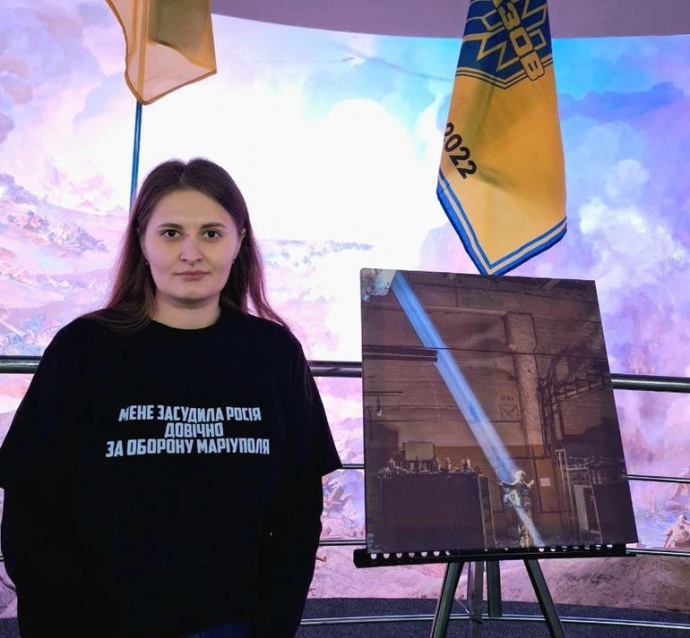
Tamara isn’t the only person in this situation. Many Mariupol defenders have been given extensive sentences – from 20-30 years to life imprisonment – for the crime of defending their city.
According to Tamara, many of them are sent to truly terrible places, including prison camps for criminals serving life: Cherny Delfin (Black Dolphin), Polyarnaya Sova (Polar Owl), Polar Wolf, and the Pyatak prison in Vologda.
"These show trials are out of control; more than 100 members of Azov Brigade alone have been sentenced. Some of the members of Azov are being held in Black Dolphin, one of the worst prisons in Russia.
It’s very difficult to come to terms with the fact that the person you were going to spend your life with is above the Arctic Circle. The uncertainty drives you crazy, not knowing whether he’s even had anything to eat on any given day," Tamara says.
Love, Mariupol and books going up in flames
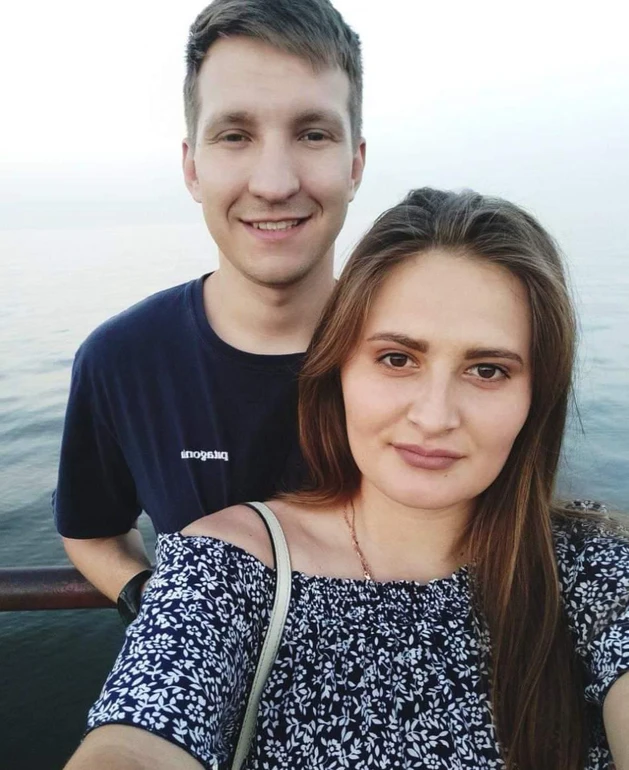
Tamara Koriahina, 23, was born in Mariupol, as was her husband Serhii. They’ve been together for over six years. They went to the same school, but didn’t know each other then, and met for the first time when they were university students.
"My husband is the best person I know. I can’t imagine my life without him. He is the life and soul of the party, always cheerful, always empathetic, kind, brave, and always ready to help," Tamara says about Serhii.
He joined the Azov Brigade (then the Azov Regiment) in 2019, while Tamara was studying philology in Zaporizhzhia. They moved in together during the Covid-19 lockdown, in 2020.
Tamara founded an English language school for adults and kids in Mariupol and Serhii pursued his interests in graphic design and literature, outside of serving in the military.
"During my first year at university, we were just friends. We started dating when I turned 19, we were planning our wedding. Unfortunately, the wedding hasn’t happened yet. Many of our friends will never be able to attend it, because they have been killed. We just got married at the courthouse," Tamara says.
When Russia invaded Ukraine in 2022, Tamara was in Mariupol and Serhii was training in Lviv Oblast, in western Ukraine. On 26 February, he texted her: "I’m home." He had joined the defence of Mariupol.
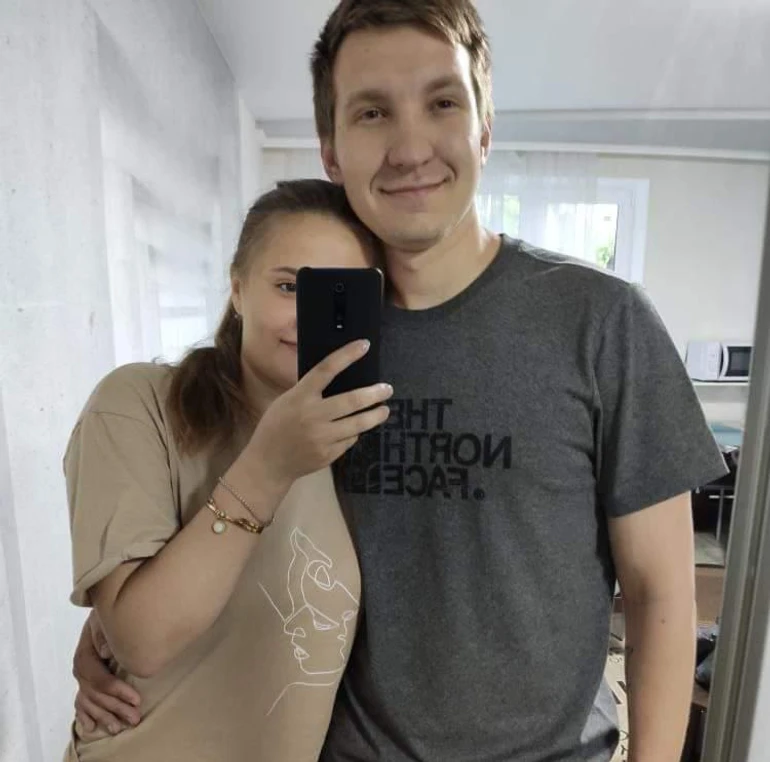
Tamara last spoke to her husband on 16 May 2022
Mobile service, heating and water were cut off in Mariupol very early in the full-scale invasion. Russian planes were circling the skies, and explosions rocked the city almost every minute.
Tamara remained in Mariupol with her grandmother and Serhii’s aunt. They burned their copies of The Divine Comedy and The Myths of Ancient Greece – Serhii’s favourite books – to keep warm. Tamara would walk over to the Mariupol Drama Theatre to find out the latest news.
On 16 March 2022, Tamara left the theatre just moments before a Russian airstrike destroyed it. That saved her life.
"We lived near Azovstal, and in the early days the occupiers extensively shelled the areas around it. We used to go to the Drama Theatre because that was where you could find out the news. There were military and police personnel there who could help you, and you could get some hot water and food there too.
I remember leaving the Drama Theatre and crossing the road, and then the theatre was hit by a bomb. I still remember the horror of that moment. It’s a miracle I survived. I remember a man, covered in blood, who ran towards me. I watched him die. There was nothing I could do to help him," Tamara recalls.
She left Mariupol on 18 March. She couldn’t contact Serhii during all that time, having not been able to since late February. She eventually got a call from him on 26 March.
"That’s when I knew Serhii was at Azovstal. Each day was like hell. I asked him when the last time he ate was, and he said: ‘I don’t remember, but I hate Snickers.’ That was the only thing they had to eat," Tamara says.
During a Russian air raid on 7 April, Serhii sustained a shrapnel wound. His phone was destroyed, and he could no longer contact his wife. He was in the field hospital for a while, but couldn’t receive surgery because of a shortage of medical supplies. He still has pieces of shrapnel in his legs.
"See you soon, get ready for the wedding"
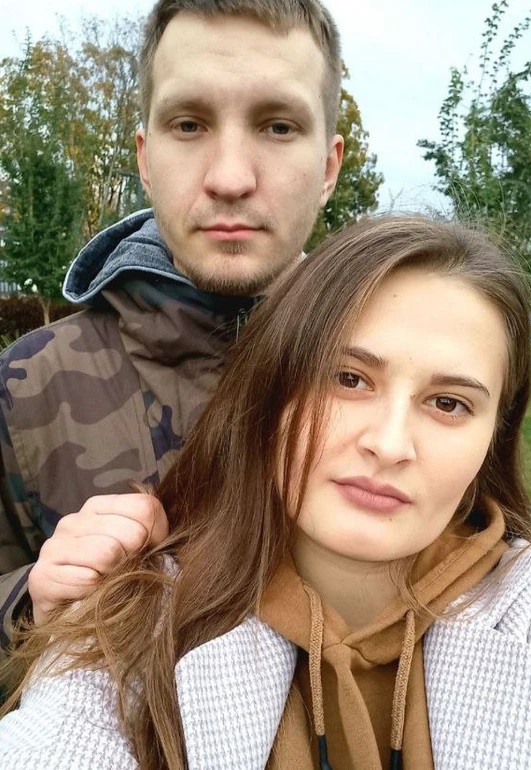
Tamara last spoke to her husband on 16 May 2022. He used his friend’s phone to send her a message: "Don’t worry, everything’s alright. We received an order to surrender. See you soon, get ready for the wedding."
"I’ve been living with this message for three years now. We have no information about our loved ones. We only see their show trials on Telegram and in Russian media," Tamara says.
She had no idea what the state of Serhii’s health was when Ukrainian forces withdrew from Azovstal. She later found out he was transferred to a pre-trial detention centre in Donetsk.
Serhii’s brothers-in-arms – those who have since been freed from Russian captivity – said that the Russians were torturing Serhii and kept transferring him from one place to another.
"I received news in May 2023 from a guy who was in a cell next to Serhii. He said they were framing him for something, and that the Russians were accusing our relatives of crimes they themselves had committed.
The case states that he 'committed a crime' in March, but this is technically impossible because he had stepped on something sharp at that time, his leg was pierced and he was in hospital for a while. He wasn't even at the positions," Tamara says.
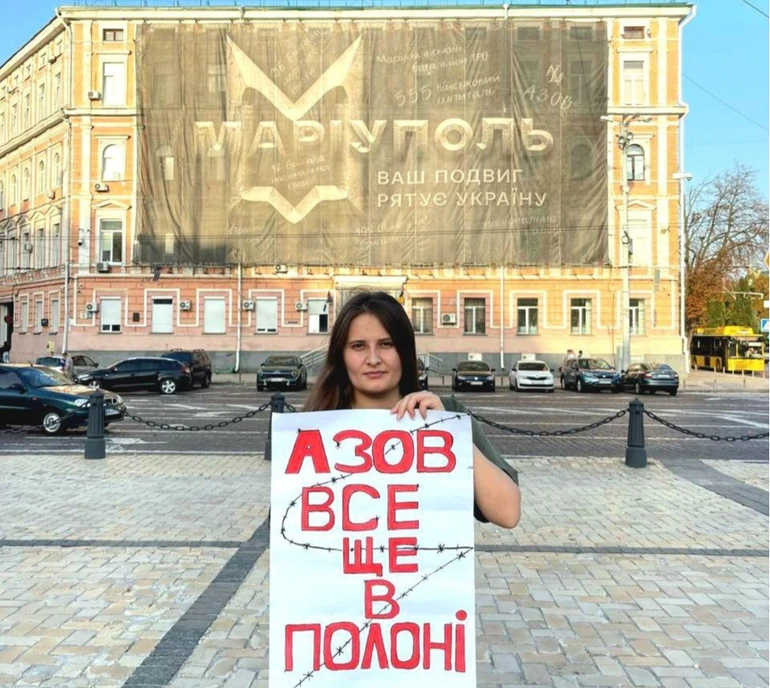
Tamara tries to keep calm, recalling Serhii's messages professing his love for her. She lives with the dream that she will soon hug her husband.
Her thoughts are consumed with how to bring him back home every day. She no longer cries because Serhii always said that crying won't resolve any situation.
"I am waiting for him. I've even learned to cook his favourite borshch, though I don't particularly like it myself," she shares.
Tamara stays in constant contact with the Coordination Headquarters for the Treatment of Prisoners of War, but the International Committee of the Red Cross has provided no news about Serhii's fate. It only confirmed his exit from Azovstal in May 2022.
"The Red Cross and the UN are organisations that don't exist for me. They recently called and inquired as to whether I had any information about my husband. I asked, isn't it their job to find out where the prisoners are? They said, 'Unfortunately, Russia doesn't allow us to.' And that was it," Tamara says.
The Azovstal defender’s wife admits her disillusionment with international human rights organisations, as they haven't visited the prison camps where the Russians are holding the defenders of Mariupol. But Tamara recently found a new glimmer of hope in a meeting with Pope Francis.
Visiting the Pope

Kateryna Prokopenko and Yuliia Fedosiuk, the wives of Azov soldiers, visited the Pope and handed him photographs of the injured from Azovstal on 11 May 2022. The families of the Azovstal defenders pleaded for the extraction of the fighters from Mariupol to a third country.
The wives of the Azovstal defenders, now illegally convicted by Russian authorities, came to see the Pope once again on 26 June 2024. Tamara was among the delegation.
The women presented the Pope with a book titled Eyes of Mariupol, translated into Italian, a list of the illegally convicted Azov soldiers, a child's drawing depicting the captured defenders, and a replica of Hands in Shackles – an installation set up on Kyiv’s Sofiia Square in honour of the Azovstal defenders.
"Many families have told foreign media about the illegally convicted prisoners, having travelled to Geneva… We decided that the Vatican was our last step. The Pope represents a powerful figure worldwide.
I hope that the Pope was moved by our story because I saw how he looked at us. I remember his eyes," Tamara notes.
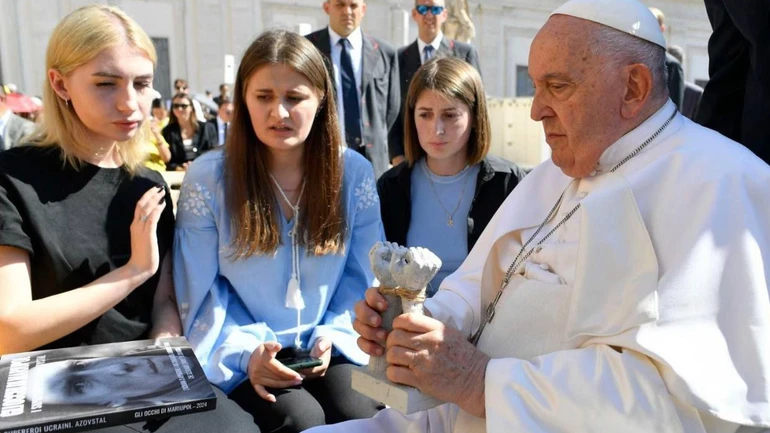
Another aim of the trip to the Vatican was also to raise awareness of the illegal trials. The wives of the Azov soldiers engaged with numerous foreign media outlets, explaining that these fabricated trials completely violate the Geneva Conventions. However, according to Tamara, some Italian journalists struggled to understand why Russia lacks the right to sentence prisoners of war.
Tamara urges Ukrainians and the international community to keep the plight of the Mariupol defenders in the spotlight, demand prisoner swaps, and to attend peaceful protests.
"The exchange of those who have been illegally convicted is highly uncertain. We are afraid that they have little chance of coming back home, but we continue the fight, telling everyone that these illegal trials are indeed a huge problem. We ask the international community to help us, to put pressure on the aggressor country," Tamara says.
Why are the trials of Ukrainian prisoners of war illegal?
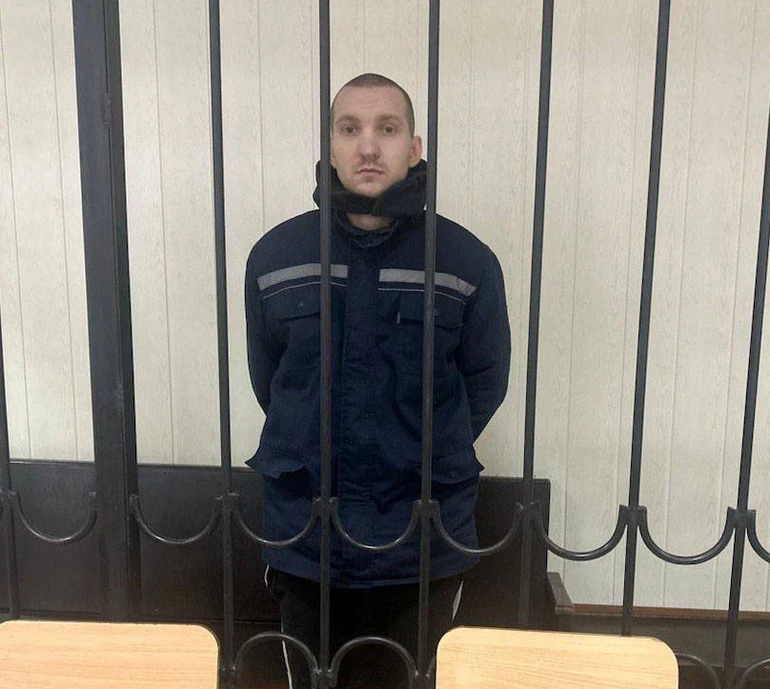
According to the Geneva Conventions, prisoners of war cannot be tried for participating in combat on behalf of their state. However, it does allow for accountability in cases of serious violations of the Geneva Conventions themselves.
Russia, in turn, attempts to accuse Ukrainian prisoners of war of committing war crimes, often charging them with killing civilians or destroying civilian infrastructure. As the Coordination Headquarters for the Treatment of Prisoners of War explained, these cases are usually based on false testimonies and forced confessions obtained under torture.
The Geneva Conventions require humane treatment and fair trials for prisoners of war. Article 99 states, "No moral or physical coercion may be exerted on a prisoner of war in order to induce him to admit himself guilty of the act of which he is accused." Yet Russia follows no such jurisprudence.
"Russia has no right to capture foreigners on the territory of another country and subject them to Russian 'justice'. These people have done nothing illegal, especially if they are members of legitimate armed forces. They were defending their country.
The fact that Russia has long used false justice and mock trials is undeniable. The judicial system under Putin is a legacy of the twisted Soviet system and Stalinist repressions. It has the entire arsenal of methods honed during Soviet pseudo-justice," the Coordination Headquarters spokesperson Petro Yatsenko said.
A vast majority of Ukrainian soldiers who came back from Russian captivity – 94% – reported torture and inhumane treatment. Thus, Petro Yatsenko emphasises that "sincere confessions of guilt" have nothing to do with reality.
"Russians are trying to accuse civilians mainly under anti-terrorism statutes and soldiers under war crimes. They also use terms like 'countering a special military operation'. This is incredibly nonsensical, arbitrary, and a violation of all international norms and rules.
Fake courts impose insanely long prison terms. We are aware of situations where even cooks who worked in the Azovstal kitchen receive court sentences," Petro Yatsenko says.
In addition, Russia does not provide adequate legal assistance to Ukrainian prisoners. Lawyers mostly play a nominal role in a staged process. Only in rare cases do lawyers show any interest in the fate of the "defendant" and contact the prisoner’s family, allowing them to at least know that the prisoner is alive.
Is it possible to free illegally convicted prisoners?
The Coordinating Headquarters for the Treatment of Prisoners of War says that it is possible.
"Of course, receiving a fake verdict is hugely stressful for the families of the serviceperson or illegally imprisoned civilian. However, from the perspective of negotiations, receiving a verdict is not an obstacle to swaps.
What is needed is simply the willingness of the other side to take back collaborators and their own soldiers. They have very little willingness to do so now," Petro Yatsenko explains.

As of 30 June 2024, the Coordination Headquarters is aware of the criminal prosecution of 620 Ukrainian servicemen in Russian captivity, although the actual number may be higher. Contrary to the Geneva Conventions, Russia does not inform Ukraine about open criminal proceedings, so the Coordination Headquarters can only monitor reports from the Russian prosecution and media.
The Coordination Headquarters tracks all locations where Ukrainians are held in the Russian Federation and temporarily occupied Ukrainian territories – currently 104 locations.
So far, only 29 illegally convicted fighters have been brought back from captivity. According to Petro Yatsenko, the main issue is that swaps are conducted rarely. Despite many Russians being captured, their country is reluctant to take back its soldiers and tries to slow down the exchange process.
"The prisons are located at considerable distances from each other, including notorious places like Mordovia and Taganrog. The treatment everywhere is inhumane. Our people face torture and humiliation, while conditions are far from those stipulated by the Geneva Conventions.
Amendments were made in 1949 to the Third Geneva Convention relative to the Treatment of Prisoners of War to address the issues of medical care, adequate food, communication with relatives, respect for human dignity, and prohibition of torture. None of this is practised. Even in places where the food may be slightly better and beatings less frequent, the conditions are much worse than what Ukraine provides for Russians," Petro Yatsenko says.
Russia does not allow representatives of the International Committee of the Red Cross to visit the detention sites or communicate with the prisoners. The Coordination Headquarters emphasises that the international community must pressure Russia to stop the torture, provide medical care to prisoners of war, and allow them to contact their families.
"The health of the prisoners is getting worse and worse. Many have been unable to contact their families for over two years, unlike Russians who can receive parcels and make phone calls.
It is crucial for the global community to pressure Russia, strengthen sanctions, and use all possible diplomatic and economic methods to urge Russia to end the torture. Our people must come back alive," Petro Yatsenko stresses.
Yatsenko also explains that it may be easier to bring back a prisoner of war who has already received a "verdict" than one who is still undergoing "trial".
"When there is a so-called 'investigation', the Russians refuse to swap the person, making excuses that the process is still ongoing. Such cases have occurred. Once the person has a verdict – even though it is enormous and false – it may no longer be an obstacle for the aggressor country's judicial system.
If the Russians decide to take back one of their own, a person with a sentence can be swapped. A verdict is not a reason for despair, though it is difficult for families," Petro Yatsenko concluded.
Olena Barsukova for Ukrainska Pravda. Zhyttia
Translation: Olya Loza and Tetiana Buchkovska
Editing: Rory Fleming-Stewart and Teresa Pearce
